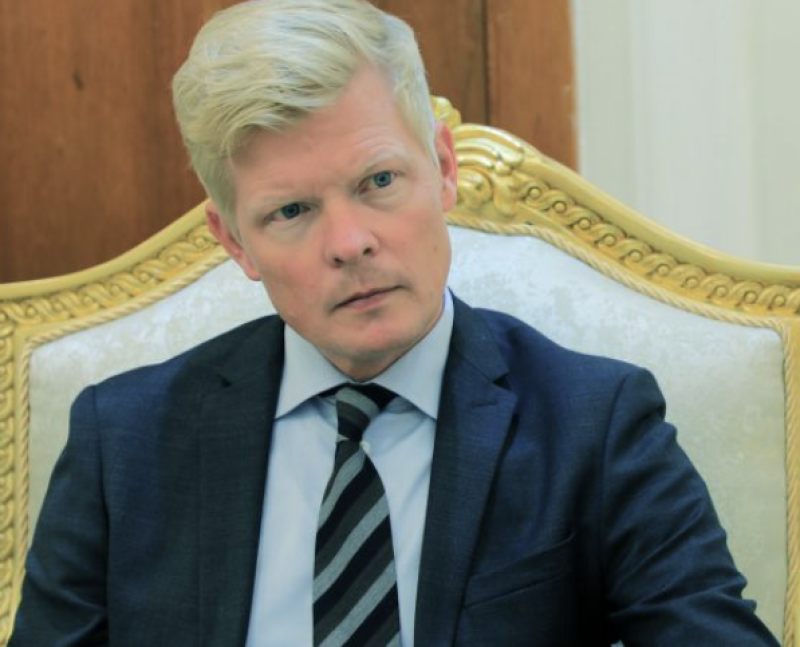Yemen fights back as Al Houthis plunder history


Yemen’s deputy culture minister, Abdul Hadi Al Azazi, remembers standing two years ago amid the rubble of a national museum in his war-torn hometown, Taiz.
Objects he had admired as a youngster - ancient limestone carvings, gilded Torah scrolls, bejeweled Islamic daggers, a 2,500-year-old mummy - were missing amid the charred debris and shattered display cases.
“The museum was wrecked and everything was stolen,” he said in a telephone interview.
“Everywhere in our country we see the same thing happening now.”
As the human suffering in war-torn Yemen has drawn global attention, less noticed have been the cultural institutions and archaeological artifacts lost or ravaged during the conflict, including thousands of antiquities taken from Yemen’s museums.
In an effort to recover some of the items, Yemeni officials visited Washington and New York in recent days to ask the Trump administration and the United Nations to help them forestall the scattering of a heritage that stretches back nearly 4,000 years.
Their central request is that the United States issue an emergency order that would ban importation of Yemeni artifacts that do not carry special documentation.
Typically, antiquities from abroad cannot enter the country without documentation mandated in one-on-one agreements between the nation of origin and the United States.
Because Yemen is not party to any such agreement, its artifacts simply need to be declared at customs in a routine way.
The Saudi-backed Yemeni government hopes the United States will impose new rules requiring importers to show proof that the objects had been legally obtained.
That proof could be in the form of a government authorization or documents proving that the items had a well-established provenance trail dating from before the civil war.
“Yemen was a cradle to many civilisations and a home to multiple faiths, particularly Judaism, Christianity and Islam, which all thrived here,” Yemen’s culture minister, Marwan Dammaj, said in New York on Wednesday.
He denounced the pillaging as “a gross affront to humanity at large.”
Restrictions on antiquity imports are usually painstakingly negotiated and require a petitioning nation to show proof of ongoing thefts, illegal excavations and illicit exports.
Care is taken not to disrupt any legal antiquities trade, or to interfere with museum loans and educational exchanges.
Nations seeking the curbs must show they are working to crack down on black markets and safeguard their antiquities.
Nonetheless, the United States has in recent years issued emergency orders on behalf of Iraq, Syria, Libya and Mali.
The Yemenis say they have strong evidence that their artifacts are being sold off by Al Houthi fighters and by terrorist groups like Al Qaida in the Arabian Peninsula and Daesh, which infiltrated the country during its current turmoil. To bolster those claims, Dammaj circulated a 290-page report in Arabic and English that details the looting at the Aden National Museum, the Taiz National Museum and the National Museum of Zinjibar.
Accompanying it is a catalog of 1,631 objects missing from the museums.
The list includes items that stretch into the depths of civilisation in a region known as a vital early trading crossroads, including ivory figurines from the Kingdom of Saba (the mythic realm of the Queen of Sheba); Roman-era gold coins and marble statuettes; and brass finials and Hebrew manuscripts from the many centuries when Jews populated what is now southern Arabia.
“It is clear that violent extremists are plundering our treasures and smuggling them overseas,” said Dammaj, who met with State and Treasury Department officials, US law enforcement authorities and UN representatives.
Officials with the State Department said that it was studying the request.
“It is important that we take steps now to prevent the further degradation of invaluable cultural property and heritage sites in Yemen,” the department said.
Dammaj said that Al Houthis had been arrested several times in the act of smuggling antiquities and had been seen ransacking cultural sites.
Although it is impossible to corroborate every allegation, independent groups that follow Yemen’s plight have also cited an Al Houthi role in the sacking of some cultural sites.
Mwatana, an independent Yemeni human rights group, has cited those forces in the looting of several museums.
Last month, the Malaysia-based Islamic Educational, Scientific and Cultural Organisation assailed Al Houthis for plundering manuscripts, historical texts and Islamic relics from the library of Zabid, Yemen’s capital during the 13th and 15th centuries.
Deborah Lehr, chairwoman of the Antiquities Coalition, a Washington group that combats cultural racketeering and helped Yemen assemble the English-language version of its report, said her group had been in contact with foreign archaeologists on the ground in Yemen who report evidence of looting by Al Houthi faction.
AFP.

Local peace initiatives in Yemen have made notable strides in recent years, eclipsing the stalled efforts of United Nations mediators since the col…

The United Nations Special Envoy to Yemen, Hans Grundberg, is facing an unprecedented wave of criticism from multiple Yemeni factions, as frustrati…

US Ambassador to Israel Mike Huckabee called for American airstrikes on Yemen after Israeli defenses shot down a missile fired by Houthi fighters t…